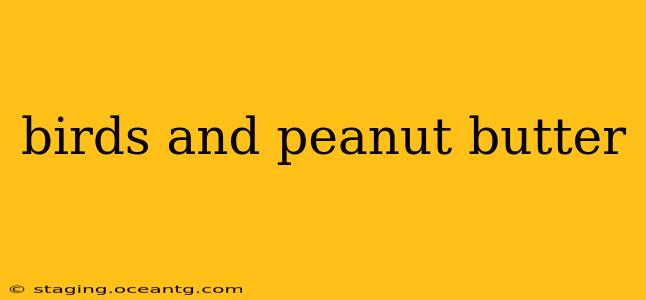Peanut butter. A delicious treat for humans, but is it safe for our feathered friends? The short answer is: it's complicated. While the creamy goodness might seem like a tempting snack for birds, feeding them peanut butter can present both benefits and serious risks. This comprehensive guide explores the intricacies of birds and peanut butter, helping you make informed decisions about offering this popular spread to your avian companions.
Is Peanut Butter Safe for Birds?
The safety of peanut butter for birds hinges on several factors, primarily the type of peanut butter and the amount offered. Xylitol, a common artificial sweetener, is extremely toxic to dogs and some other animals, but thankfully is not commonly used in peanut butter for human consumption. However, other ingredients, like added salt and sugar, are detrimental to birds' health in even small quantities.
Safe peanut butter options for birds should be:
- Unsalted: Avoid salted peanut butter entirely. Salt can be toxic to birds in even small quantities.
- Unsweetened: Added sugar provides no nutritional value and can contribute to health issues.
- Plain: Stick to peanut butter with no added ingredients like honey, chocolate, or artificial flavors.
- Smooth: Chuncky peanut butter can pose a choking hazard, especially for smaller birds. Smooth peanut butter is far safer.
What are the Benefits of Giving Birds Peanut Butter?
In moderation, and with the right type, peanut butter can offer some nutritional benefits to birds. It's a good source of:
- Protein: Essential for muscle growth and overall health.
- Healthy Fats: Provides energy and supports various bodily functions.
However, these benefits are easily overshadowed by the potential risks if not administered carefully.
What are the Risks of Feeding Birds Peanut Butter?
Despite potential benefits, the risks associated with feeding birds peanut butter are significant:
- Obesity: Peanut butter is high in calories and fat. Overfeeding can lead to obesity, which dramatically reduces a bird's lifespan and increases susceptibility to disease.
- Choking: As mentioned, chunky peanut butter presents a serious choking hazard.
- Aflatoxins: Peanut butter can sometimes contain aflatoxins, a type of mold that is toxic to birds. While rare in commercially produced peanut butter, it's a risk to consider.
- Salt Poisoning: Salt is extremely toxic to birds. Even small amounts in salted peanut butter can lead to serious illness or death.
- Nutritional Imbalances: Relying on peanut butter as a significant part of a bird's diet can lead to nutritional imbalances. A varied and balanced diet is crucial for their well-being.
How Much Peanut Butter Can I Give My Bird?
There's no one-size-fits-all answer. The appropriate amount depends heavily on the bird's size, species, and overall diet. A tiny amount, no larger than a pea-sized blob, offered very sparingly as an occasional treat is the safest approach. Always observe your bird closely after offering peanut butter, watching for any signs of distress or adverse reactions.
Can Wild Birds Eat Peanut Butter?
While some backyard bird enthusiasts offer peanut butter to wild birds, it's generally not recommended. The risks mentioned above remain, and uncontrolled feeding can attract large numbers of birds, leading to overcrowding, disease spread, and potential environmental damage. Furthermore, birds have evolved to eat specific foods in their natural habitats and relying on supplemental food sources can disrupt their natural feeding patterns.
Focus instead on providing natural food sources such as seeds, nuts (in moderation and unshelled where possible), fruits and berries, and suet.
What are some alternative healthy treats for birds?
Instead of peanut butter, offer your birds a more appropriate selection of treats, including:
- Unsalted, unsalted sunflower seeds
- Small pieces of fresh fruit (in moderation)
- Cooked, unsalted grains
- Mealworms
Remember, a balanced diet is paramount for a healthy and happy bird. Always consult with an avian veterinarian before introducing any new foods into your bird's diet.
Conclusion:
While the allure of sharing peanut butter with our feathered friends is tempting, caution is crucial. The potential risks outweigh the minimal benefits, especially if not carefully managed. Prioritizing a varied, balanced, and species-appropriate diet is the best way to ensure your bird thrives. Remember, a small, infrequent treat of plain, unsalted, smooth peanut butter can be acceptable for some birds, but always prioritize their health and well-being.
